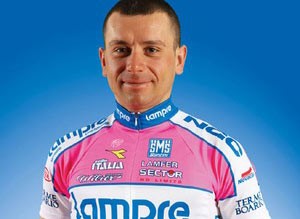Two year ban confirmed, CAS says proof of blood manipulation was evident
 In addition to the suspension imposed on Italian rider Franco Pellizotti today, a similar two year ban was confirmed for his compatriot Pietro Caucchioli by the Court of Arbitration for Sport. Significantly, the CAS announcement was accompanied by what appears to be a convincing endorsement of the biological passport, which both Caucchioli and Pellizotti had sought to portray as deeply flawed.
In addition to the suspension imposed on Italian rider Franco Pellizotti today, a similar two year ban was confirmed for his compatriot Pietro Caucchioli by the Court of Arbitration for Sport. Significantly, the CAS announcement was accompanied by what appears to be a convincing endorsement of the biological passport, which both Caucchioli and Pellizotti had sought to portray as deeply flawed.
CAS stated that the UCI had examined many samples belonging to the latter in the period between April 2008 and May 2009, prior to informing him on June 17th that it considered he had been blood doping. The-then Lampre rider was ultimately suspended by CONI for two years on June 3rd 2010, with the start date being set at 18 June 2009.
Caucchioli decided to fight this and appealed the decision to CAS on July 23rd 2010.
The CAS arbitrators said that they considered all of the arguments pertaining to the case, including what the said were those relating to the reliability and the interpretation of the results.
The verdict was clear, and came down on the side of the UCI. “With the assistance of the experts appointed by the parties, the CAS Panel has reviewed in detail the biological passport program applied by the UCI and has found that the strict application of such program could be considered as a reliable means of detecting indirect doping methods,” it announced.
“The CAS Panel also examined all the objections raised by the athlete concerning possible preanalytical and analytical irregularities which could have been committed by some laboratories and which could, in turn, have affected the reliability of the results. After a thorough examination, the CAS Panel found that the “irregularities” put forward by the athlete could not have affected the results.”
It said that it considered that CONI had successfully established the use of prohibited doping methods. It concluded that, “the variations in the haemoglobin concentration values during the period between April and October 2008 could not be considered as physiological but, on the contrary, were characteristic of blood taking thus demonstrating the blood manipulation in view of doping.”
The validation of the result, and that relating to Pellizotti, is an important finding for the UCI and its biological passport. A defeat in either case would have been a blow to the initiative, which is different to traditional anti-doping measures in that it looks for indirect signs of doping rather that a clear positive test. It uses a panel of independent anti-doping experts, who carefully consider suspicious cases before deciding if they are guilty or not.
Two more cases relating to the biological passport are yet to be decided. These relate to the Slovenian rider Tadej Valjavec and the Italian Francesco De Bonis. Like Pellizotti and Caucchioli, both are seeking to discredit the passport; it remains to be seen if they too will meet the same fate, or if one or both can convince CAS that their cases are different.